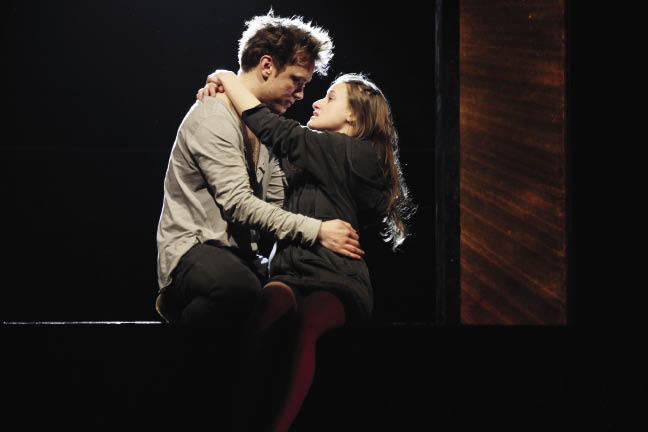Deceptively attractive. Romeo and Juliet tempts directors and leads them on while keeping all its false doors and secret pitfalls out of view. Rupert Goold’s RSC production is two fifths good and three fifths indifferent. A respectable score. This lovely, tricky and rather silly play isn’t the work of a genius but of a jobbing apprentice with a careless, or perhaps ambitious, sense of what could be managed on stage.
Goold adds a spot of extra bother here and there, overusing the balcony, bunging Arabic music into the masque ball, and botching the costumes. Spectacular irrelevance seems to be his guiding principle. The street brawls are enlivened by whooshes of flame surging up from beneath the boards like an oil-rig blow-out. A circular manhole cover keeps popping out of the floor for actors to jump up on to and strike a pose. And Tybalt wields a special glove, like a Bond baddie, fitted with a hidden flick-knife.
The show’s most notable and grating feature is the casting. It’s all over the place. Literally, the roles seem to have been assigned to the regional finalists in a nationwide elocution competition. Mercutio is an Ulsterman. Tybalt is from Glasgow. Benvolio is Welsh, Friar Laurence is from Ant and Dec country, Romeo and Juliet are southern yuppies while Lady Capulet, oddly enough for a Veronese aristocrat, is a chain-smoking depressive from Leeds.
Some performers have been encouraged to supplement their roles with bursts of comedy improvisation. A treat in the rehearsal room. A drag in the theatre. Mariah Gale catches Juliet’s note of deranged truculence very convincingly and Richard Katz, as her father, is brilliantly menacing and faultlessly suave. Jonjo O’Neill looks everywhere for Mercutio — comedy, tragedy, lyric poetry, melodrama, and comedy again — and doesn’t quite track him down. Noma Dumezweni as the Nurse is marvellous and entirely wrong. She’s four decades too young: a street-smart elder sister not an excitable old maid thrust into the centre of a romantic intrigue. Lots of comedy disappears with that choice.
The hazy character of Romeo, a soppy thug with a silver tongue, is played by Sam Troughton in the most obvious way: a pre-Varsity Hamlet, dishevelled, lustful, thoughtless and a bit cross, the Dane without Montaigne (but it’s an awful role anyway. Gielgud hated it). And the costumes? All the players wear drab period gear apart from the romantic leads, who delight us with their skanky old tracksuits and trainers. This makes the play ‘accessible’ (a new word for ‘provincial’, formerly a vice but now an obligation), until the final scene when the pattern is reversed.
The leads wear period dress, the supporting cast street-gear. Meaning what exactly? Dunno. But for Juliet it means she gets to wear an Elizabethan wedding dress with a wraparound off-the-shoulder ruff which makes her look as if she’s emerging from a giant shuttlecock. All my objections could be dismissed as the sensitivities of a ‘purist’ — or fuddy-duddy if you prefer — but those who have no previous experience of Shakespeare (and a high proportion of first-timers begin with this play) are purists of necessity. They want the production conveyed directly and authentically, not burdened with add-ons and hotshot flourishes from alien traditions. Nothing interests us in Shakespeare more than Shakespeare.
At the Old Red Lion, a world first. Decline and Fall has never been adapted for the stage. Until now. Tom King’s spirited production features Sylvester McCoy in the lead role. But which is the lead? Not Paul, he’s more of a lens through which we view the kaleidoscope as it turns and glitters. McCoy plays Captain Grimes, in suitably seedy fashion, but he also has to double as the Master of Scone, Professor Silenus, the prison governor and one or two others as well. This is a low-budget, high-energy production.
Emily Murphy plays Flossie and Lady Circumference in the same scene, which is all but impossible. And no dramatisation can hope to replicate the delicious contrast between the elegance of Waugh’s prose and the ramshackle burlesque of his tale. There is much invented dialogue, and some peculiar changes to favourite lines. The fox mentioned in the opening scene is ‘stoned to death with champagne corks’. Corks? Bottles, I think. The show’s best feature, Fay Downie, plays Margot with a terrific blend of poise, regality and sexual allure. One always feels she’s simply a delightful creature and not a cheating, faithless minx. Which is exactly how Paul sees her. This interesting experiment would succeed much better with a slightly more solid effort from the investors. Great fun, if not quite great theatre.







Comments